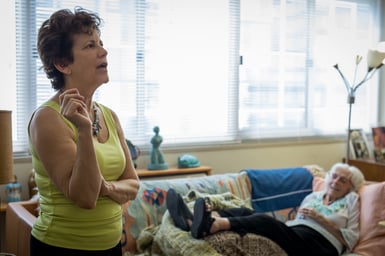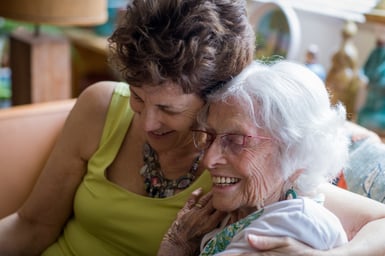When you envision your “golden years,” what do you see? Are you living independently, being active, and enjoying life? Or do you worry that you’ll struggle with declining health and physical limitations? For many seniors, reality falls somewhere in between. Perhaps you see that in your own aging parents.
Find in-home personal care services for your loved one>>
Sometimes when a parent ages, it can be a shockingly quick transformation. In a short period of time, their physical appearance or mental acuity may decline rapidly, and you may have no doubt that you need help to keep them living safely at home. For others, however, the deterioration may be more gradual and less obvious.
Regardless of their physical and mental status, most seniors prefer to remain living in their homes. However, aging parents may need care to keep them safe and manage their activities of daily living. The responsibility of caring for elderly parents often falls on the adult children—making them a family caregiver—whether they are prepared to take on that role or not.


How do I know if my elderly parent needs care?
Here are some questions to ask yourself if you have concerns about your parent living independently. If you answer yes to any of these questions, it’s worth your time to consider the options available for caring for elderly parents.
-
Are you sensing a decline in their personal hygiene?
-
Do you notice any unusual bruising or skin tears?
-
Do they appear unsteady when walking, lose their balance, or have difficulty getting in or out of a chair? Can they put on their shoes? Have they had any recent falls?
-
Do you sense changes in mental acuity, such as decision-making, organization, or forgetfulness?
-
Do you sense a lack of interest or ability to keep up with regular tasks like laundry or housekeeping?
-
Are they losing track of their medications or not taking recommended doses?
-
Are they driving dangerously, or do they easily become lost in familiar areas?
-
Have they stopped preparing meals or eating at regular times, or do they miss meals completely?
-
Are they leaving the stove on or cigarettes burning?
-
Is your parent getting enough physical activity and social contact?
How can I best help my parent?
Assess the situation
So, now you’ve determined that your parent needs assistance to stay safe and independent at home, but you’re not sure if you and other family members can handle the caregiving responsibilities—or if you should consider other options, like senior care at home. How do you know?
Your first step should be to talk to your parents and help them realistically assess their living situation. Discuss all issues openly and address any problems or struggles you see. Here are some specific issues to explore:
-
Is your parent’s living environment safe? Many older Americans are injured in and around their homes by common hazards such as the improper location of electrical and phone cords; outdated electrical outlets and switches; slippery rugs, runners, and mats; improper location of smoke detectors or dead batteries; unsafe use of space heaters; and poor lighting.
-
Is your parent prepared financially? With your parent's permission and understanding of the importance of gathering this type of information, a complete review of their medical, financial, and legal documents will help identify potential problem areas. At a minimum, make sure you understand all sources of income, assets, and debts. Review medical and insurance coverage to ensure it is adequate. Find out if your parent has a will, an up-to-date and timely living will, and power of attorney and where these documents are located. If these documents don’t exist, discuss the need for them. Consider hiring an elder care attorney through the National Academy of Elder Law Attorneys, Inc., or NAELA. A virtual planning session with an attorney can be an even more effective and less stressful option than an in-person meeting.
-
How is your parent’s mental and physical health? Monitor your parent closely for changes in physical and mental health. Be aware of any medications that your parent is taking and consult your parent’s health care provider regarding any specific requirements. Ensure that they have received basic vaccinations such as those for the flu and in some cases, pneumonia.
-
Can you (or other family members) realistically provide assistance? Even with the best of intentions, family members often struggle to provide the amount or kind of care their aging parent needs. Do you live nearby? Do you have the time, between other obligations like work and children who need your attention as well? If your parents need personal care (eg, help with bathing and dressing), are you and they comfortable with your taking on that task?
Caring for elderly parents can be overwhelming. Recognize that you may also need support in order to avoid caregiver burnout. To cope with the stresses, consider joining a support group for caregivers, explore resources available through your work (eg, flex time or counseling), share responsibility with other family members, and consider as-needed respite care services offered by home care agencies.
Do we need professional home health care services?
You're not alone in your concerns about caring for elderly parents. Many elder home care services are available to help your parent live comfortably, independently, and safely at home—either instead of, or in complement to, family caregiving. For those parents needing assistance with activities of daily living (ADLs), personal care and companionship services are typically the best fit.
With this kind of care, home health aides (HHAs) or certified nursing assistants (CNAs) provide help with ADLs that may include assistance with:
-
Bathing, grooming, using the toilet, and dressing
-
Meal planning and preparation
-
Light housekeeping, laundry, and running errands
-
Medication reminders and picking up prescriptions
-
General companionship, transportation, and escorts to appointments, church, or meetings
-
Hobbies and activities, such as exercise
Most home care providers can build a schedule suited to your family’s needs, including live-in care as an option for those requiring ‘round-the-clock supervision (such as those with dementia). In addition, most providers offer flexible respite care coverage as needed, allowing family caregivers like a spouse or adult child to take a break and get the rest and rejuvenation they need to maintain their own health and well-being.
Inviting caregivers into your parent’s home is a big decision for the entire family. Choosing the right home care company to provide that care can be the best decision for everyone—and can make your parent’s golden years that much brighter.
Visit bayada.com for resources, or call your local BAYADA office to learn how we can help you care for your family member.



Let Us Know What You Thought about this Post.
Put your Comment Below.